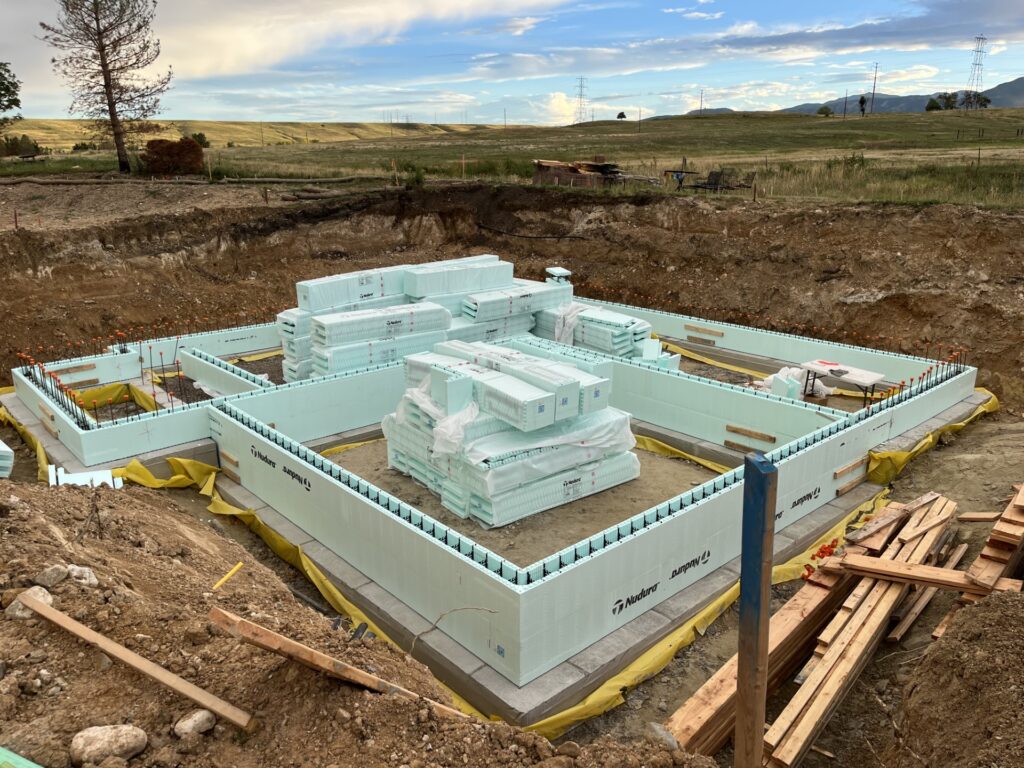A Smarter Way to Build
In today’s world, homeowners are looking for more than just a place to live. They want homes that are built to last, efficient to maintain, and capable of withstanding whatever nature throws their way. That’s where Insulated Concrete Form (ICF) homes come in. While traditional wood-frame houses have been the norm for decades, ICF construction is quickly proving to be the smarter choice. From energy efficiency to storm resistance, ICF homes offer a level of durability and comfort that is hard to match.
What Makes ICF Homes Different?
Unlike traditional construction methods that rely on wood framing, ICF homes are built using interlocking, insulated concrete forms that create a solid, reinforced concrete structure. These forms stay in place permanently, providing an extra layer of insulation that enhances the home’s overall strength and efficiency. The result is a structure that is not only incredibly sturdy but also highly energy-efficient and resistant to fire, mold, and pests.
One of the standout features of ICF homes is their ability to maintain consistent indoor temperatures. Because the walls are made of thick, insulated concrete, they help regulate heat flow, keeping the home cooler in the summer and warmer in the winter. This means homeowners can enjoy a more comfortable living environment without relying heavily on heating and cooling systems, leading to significant energy savings.
Unmatched Strength and Durability
When it comes to withstanding the elements, ICF homes are in a league of their own. The solid concrete walls provide exceptional resistance against hurricanes, tornadoes, and even earthquakes. Unlike wood-framed homes, which can suffer severe damage in extreme weather, ICF structures remain intact under the harshest conditions.
In coastal areas and regions prone to natural disasters, the demand for stronger, more resilient homes is growing. With climate change bringing unpredictable weather patterns, homeowners are looking for construction methods that offer peace of mind. ICF homes provide that security by standing strong against high winds, heavy rain, and flying debris, significantly reducing the risk of structural damage.
Energy Efficiency That Pays Off
One of the biggest advantages of ICF homes is their energy efficiency. Traditional homes often struggle with air leaks, temperature fluctuations, and high utility bills, but ICF construction eliminates many of these issues. The continuous insulation provided by the concrete forms creates a thermal barrier that prevents heat loss in the winter and keeps cool air inside during the summer.
This energy efficiency translates into substantial cost savings. Homeowners who choose ICF construction often see a dramatic reduction in their heating and cooling expenses. In some cases, energy bills can be cut in half compared to a conventional home. Over time, these savings add up, making ICF homes not only a smart investment but also a more sustainable option for the environment.
A Quieter, More Comfortable Home
Beyond energy efficiency, ICF homes also offer exceptional soundproofing benefits. The thick concrete walls act as a natural barrier to outside noise, creating a peaceful and quiet indoor environment. For homeowners who live in busy neighborhoods or near highways, this sound insulation can make a huge difference in overall comfort.
The same insulation that helps regulate temperature and block out noise also contributes to better indoor air quality. Unlike wood-framed homes, which can develop mold and mildew over time, ICF structures are highly resistant to moisture-related issues. This means fewer allergens in the air, making ICF homes a healthier choice for families, especially those with allergies or respiratory concerns.
Fire Resistance and Pest Protection
Another major advantage of ICF construction is its resistance to fire and pests. Wood-framed homes are vulnerable to termites, carpenter ants, and other pests that can cause significant structural damage. ICF homes, on the other hand, eliminate this risk entirely. Since concrete is not a food source for insects, homeowners don’t have to worry about infestations that can weaken their home’s integrity over time.
Fire resistance is another critical factor. Traditional wood-frame homes can go up in flames quickly, putting lives and property at risk. ICF walls, however, have a high fire rating and can withstand extreme temperatures for hours before showing any signs of structural compromise. This added level of protection can make all the difference in an emergency situation, providing homeowners with more time to escape and reducing the overall damage caused by fires.
Long-Term Savings and Return on Investment
While the upfront cost of building an ICF home may be slightly higher than traditional construction, the long-term savings far outweigh the initial investment. Lower energy bills, reduced maintenance costs, and a longer lifespan make ICF homes a financially sound choice. Unlike wood-framed homes that may require frequent repairs and replacements due to rot, termites, or weather damage, ICF homes remain strong and low-maintenance for decades.
Additionally, homes built with ICF technology often have higher resale values. Buyers are becoming more educated about the benefits of energy-efficient, disaster-resistant homes, and many are willing to pay a premium for a house that offers these advantages. Whether you’re planning to stay in your home for years or considering selling in the future, investing in ICF construction is a smart financial decision.
Building for a Sustainable Future
Sustainability is becoming an increasingly important factor in the construction industry, and ICF homes are leading the way in eco-friendly building practices. By reducing energy consumption, minimizing waste, and utilizing durable materials, ICF construction supports a more sustainable future. The long lifespan of ICF homes means fewer materials are needed for repairs and renovations, reducing the overall environmental impact.
Many ICF homes also incorporate renewable energy sources, such as solar panels, to further enhance their efficiency. When combined with ICF construction, solar energy can make a home nearly self-sufficient, drastically lowering utility costs and reducing dependence on fossil fuels. As more homeowners prioritize sustainability, ICF homes offer a solution that aligns with both environmental and financial goals.
The Future of Homebuilding
With all the benefits that ICF construction has to offer, it’s no surprise that more and more homeowners are making the switch. From energy efficiency and durability to fire resistance and soundproofing, ICF homes provide a level of quality and comfort that traditional wood-framed homes simply can’t match. As extreme weather events become more common and the need for sustainable building practices grows, ICF homes are proving to be the future of residential construction.
Choosing to build with ICF is more than just a smart investment—it’s a commitment to long-term durability, lower maintenance costs, and a healthier, more comfortable living environment. Whether you’re planning a new home or considering a rebuild, ICF construction offers the best of both worlds: strength and sustainability.
In the end, building a home is one of the most significant decisions a person can make. Why settle for outdated construction methods when a better option exists? ICF homes are changing the way people think about homebuilding, and it’s only a matter of time before they become the new standard for smart, efficient, and resilient living.





